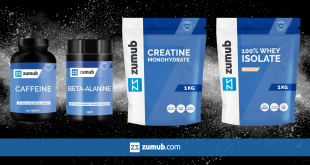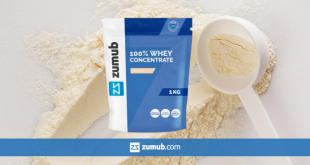Protein is one of my favorite macronutrients because it has many benefits and it’s essential.
But…What is protein and what is it good for?
I won’t write a technical article and explain the biochemical part and say that proteins are macromolecules that are composed of carbon, hydrogen, oxygen and nitrogen.
It will be easier to understand and to realize its importance if we look at protein from practical situations.
Everyone needs this macronutrient for their body to function properly and protein needs vary from person to person.
One of the main factors that causes protein needs to vary, is physical activity.
So for athletes protein is especially important!
In this article, I’ll try to clarify more about protein, what it’s good for and what the recommended daily needs/doses are, taking into account the type of physical activity (endurance or weight training).
What is protein?

Together with carbohydrates and fats, proteins form the set of macronutrients needed to ensure the proper functioning of our body.
They are composed of amino acids and their function within the organism is “constructive“.
It means that its function is to repair and to create tissues, hormones, enzymes and neurotransmitters to ensure that your body stays healthy and strong, inside and out.
Protein also functions as a secondary source of energy when there’s no presence of carbohydrates, i.e., when you’re not giving enough carbohydrates to your body, proteins are used for energy. And that’s not ideal.
Why? Because it steals proteins from the muscle mass, compromising your muscle growth.
Therefore, you should give much importance to proteins in your diet but also to other nutrients so you don’t compromise its function (in addition, the other macronutrients will help in the absorption of proteins by your body).
Why does your body need protein?
You need protein because it’s the building block of everything we do every day.
It’s the main constituent of muscles and most of the organs of our body. It’s present in all cells of our body.
As its function is to “build” and to repair, it will be critical for the repair and for the “building” of tissues in our body. It’s essential for our growth and development.
Therefore, protein is very essential to build muscle mass, and it’s even more important for athletes.
In addition, it’s also fundamental for the recovery process – especially after physical exercise (because it’s during recovery that muscle tissue is regenerated and built).
There are many people who forget about this detail!
Recovery is key to doing things right, if you don’t have enough time to sleep/rest and the proper nutrition, you’ll never be able to maintain this lifestyle.
Benefits of protein for athletes
Therefore, taking into account its functions, protein has the following benefits:
- Helps the body to recover post-workout
- Repairs and builds muscle tissue
- Decreases muscle fatigue
- Supports the diet process: proteins help to maintain lean muscle mass and to control the appetite (they increase the feeling of satiety because they take longer to be digested)
Studies have shown that: “(…) higher protein diets have quite consistently been shown to result in greater weight loss, greater fat loss and preservation of lean mass as compared with” lower” protein diets.”
Despite the benefits, protein needs vary from person to person.
One of the factors that causes this need to vary, is physical activity.
Check out some of the recommended doses of proteins!
How much protein do you need?
Recommended doses
The protein intake varies by type of activity.
Each level and type of activity requires higher or lower amounts of proteins.
It won’t be necessary the same amount of proteins for a person who’s preparing for a strength test/training as for a person who’s simply sitting in an office all day without exercising.
1. How much protein does an adult with minimal physical activity need?

For people who don’t exercise or move very little daily, 0.8 grams of protein per kilogram of body weight is recommended.
However, for someone with a higher level of physical activity, this may not be enough, as you can see in the Journal of the International Society of Sports Nutrition:
“(…) an abundance of research indicates that those individuals who engage in physical activity/exercise require higher levels of protein intake than 0.8g/kg body weight per day, regardless of the mode of exercise (i.e. endurance, resistance, etc.) or training state (i.e. recreational, moderately or well-trained).”
2. How much protein does an endurance athlete need?

An endurance athlete, a cyclist or runner, for example, whose main fuel is, usually, carbohydrates, although he doesn’t exert the same type of stress on the muscles as a bodybuilding athlete (or an athlete who does a workout based on weight lifting), will also need proteins, especially to repair muscle tissue.
Even if the priority isn’t to increase muscle volume, the muscles are also affected by activity and need proteins to rebuild and recover.
For people who do exercise, but only aerobic (cardio) or endurance sports, the recommendations can vary between 1 and 1.6 grams of protein per kilogram of body weight, with 1.6 being the reference value for elite athletes.
(During periods of greater effort – in a phase of intense trainings – I recommend a consumption between 1.4 and 1.8g)
But to those who do this, I also want to remind you that you have to add weight training. Only cardio may not be enough to withstand the requirements of endurance training. It will also help you to improve your performance.
3. How much protein does an athlete who does bodybuilding/weightlifting need?

Increasing the protein intake is quite common among athletes who do bodybuilding and weight lifting. Protein works as a “fuel” because without it, it will be difficult to recover the muscle tissue that’s damaged during workouts and to build muscles.
For all those who do weight training and bodybuilding, the recommendations are between 1.5 and 2.0 grams per kilogram of body weight.
But if you’re emphasizing on losing fat or gaining muscle mass with intensive trainings, your needs may increase, that’s why I recommend up to 2.5 grams per kilogram of body weight.
Take note:
Attention! These amounts are variable. Consumption needs may depend on both the type and the level of activity.
You must do a personalized calculation to find out the amount that you need to take to meet your requirements and to achieve your personal goals.
Proteins can be obtained from different food groups, such as: fish, eggs, red and white meats, nuts and some vegetable protein sources, such as legumes.
In addition, if we don’t meet our daily protein requirements, we can obtain them through protein shakes!
 Zumub.com Official Blog Everything about Fitness, Gym, Nutrition and Supplementation. Read articles written by Zumub.com specialists and expert guests.
Zumub.com Official Blog Everything about Fitness, Gym, Nutrition and Supplementation. Read articles written by Zumub.com specialists and expert guests.




One comment
Pingback: 5 Myths about protein that are now clarified | Zumub.com